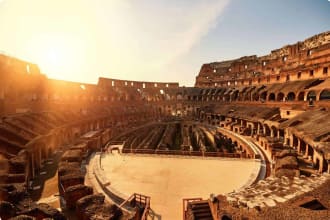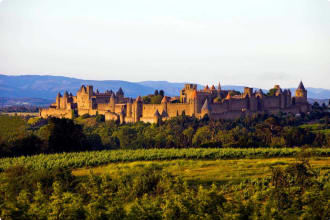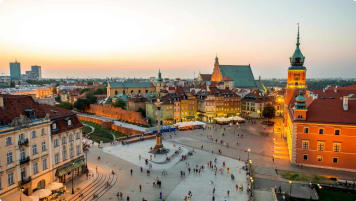Romans in France small group specialist history tours for seniors
Join our small group tour to explore what remains of the Roman Gaul. France, Belgium, Luxembourg and South-west Germany were occupied by Roman Gaul some 2,000 years ago. To this region the Romans brought roads, bridges, education, cities and, perhaps, above all the Peace of Rome.
From A$16,995AUD

Highlights
- 1. Understand the importance of Pont de Gard, transporting water for 50kms
- 2. In Nimes, the jewel in the Roman crown, visit temples, towers and theatres to understand the importance of the city.
- 3. Visit the 200 room Gallo-Roman villa at Montmaurin
- 4. Explore and understand the importance of Arles for the Romans

Departure Dates
| Departure Date | Price |
|---|---|
| 18 August 2025 Ends 06 September 2025 • 20 days A$17,845 Twin A$20,995 Single Available | Selected |
| 31 August 2026 Ends 20 September 2026 • days A$17,845 Twin A$20,995 Single Available |
Romans in France small group history tour for seniors
Odyssey offers easy, convenient, and relaxed escorted small group tours across Western Europe and beyond. We explore France’s fairy-tale natural beauty, its ancient Roman heritage, its World Heritage Sites, and world famous cities, all with some truly spectacular scenery along the way. This and more is all waiting to be explored on one of Odyssey’s small group tours of France, designed for the senior traveller, and led by experienced, and enthusiastic like minded people.
This escorted small group tour is designed for senior or mature travellers who like to learn and everyone who is keen to delve into history are welcome, be in couples or a solo traveller. The Romans in France tour explores some of the major remains of the Roman occupation between the 1st century BC and the 4th century AD through beautiful landscapes. Roman Gaul occupied an area that includes modern European countries such as France, Belgium, Luxembourg, and Germany southwest of the Rhine. To this area the Romans brought roads, bridges, education, and cities. Perhaps, above all, they brought the Pax Romana or Peace of Rome. It was the resulting freedom from pirates, roving bandits, and other invaders which allowed the area to grow prosperous. During their occupation they built magnificent villas, aqueducts, amphitheatres, theatres, temples, and whole cities. The remains of these structures are visible today, 2,000 years later.
Roman Emperor Augustus completed the conquest of Gaul between 27 and 12 BC. For the next 200 years the “Roman Peace” was maintained with the exception of a few local revolts and occasional civil strife.
Romans in France Small Group Tour Itinerary & Highlights
During this specialist history tour we will visit quaint villages, explore many hidden gems and amazing scenery, and gain a deep understanding of the Roman era in France with the help of local guides. Toulouse is our departure point and after an initial night there, our educational tour begins in Carcassone. One of our first stops is to explore the Gallo-Roman villa at Montmaurin. This once-palatial villa was one of the most luxurious in all of Gaul with some 200 rooms. The picturesque ruins include the remains of a temple, baths, mosaics, and extensive gardens. The Romans fortified the hilltop on which the old city now stands, around 100 BC. Parts of the lower courses of the Northern Ramparts date back to the Gallo-Roman period, though most of the city is medieval, restored in 1853.
In Arles, we take an escorted walking tour of the city. Aigues-Mortes (dead waters) rises from the marshes of the Camargue. It is considered to be the purest example of 13th-century military architecture in France. It looks much as it did in the medieval period with its neatly rectilinear streets and crenelated walls with their 5 towers and 10 fortified gates. Roman ruins, dating back to around 102 BC, have been discovered beneath the ancient Abbey.
From Aigues-Mortes we travel on to Arles for a half-day tour with a local guide. Roman Arles had a population roughly twice the size that it does today and was an important trading centre on the route between Italy and Spain. Arles is now famous mostly for its Roman arena and its association with Vincent Van Gogh. There will be time to visit the arena and the main square where we can stop to view “Van Gogh’s café.
This Romans in France small group tour also includes a stop in Nimes, the jewel in the Roman crown. Here we visit temples, towers, and theatres to understand the importance of the city. We also visit the 200-room Gallo-Roman villa at Montmaurin, along with the Roman Legion camp of Vindonissa in Switzerland.
You can learn more about France with our country profile where all the other tour departures are listed as well. For more details about this tour, please click the 'Top 5'or 'Itinerary' buttons above! If you’re keen to experience this tour, please call or send an email. Or, to book, simply fill in the form on the right hand side of this page.
Gallery









Itinerary
20 days
Day 1: Toulouse
Accommodation: 01 night at Mercure Toulouse Saint Georges or similar.
Make your own way to your hotel in Toulouse in time for a welcome meeting with your tour leader followed by dinner in the hotel.
Day 1: Carcassonne
Accommodation: 02 nights at Mercure Carcassonne or similar.
After breakfast depart by coach for Carcassonne via the Gallo-Roman villa at Montmaurin for a guided tour. This once palatial villa was one of the most luxurious in all of Gaul with some 200 rooms. The picturesque ruins include the remains of a temple, baths, mosaics and extensive gardens.
Lunch will be provided at a nearby restaurant to sample the famous French cuisine before we continue on to the world heritage walled city of Carcassonne. The Romans fortified the hilltop on which the old city now stands around 100 BC and parts of the lower courses of the Northern Ramparts date back to the Gallo-Roman period though most of the city is Medieval, restored in 1853.
Day 2: Carcasonne & Narbonne
Accommodation: Mercure Carcassonne or similar.
After breakfast a local guide will take us on a tour of the old city including entry into the Chateau Comtal, the medieval castle within the walls.
After lunch (at own expense) the coach will transport the group to Narbonne for a half day city tour. Narbonne was established on the Via Domitia, the first Roman road in Gaul, in 118 BC. The Via Domitia connects Italy and Spain and as such was an important trade route. Our city tour will include entrance to the Roman Horreum, a former granary and the only building to survive from the Roman period, and into the Musee Lapidaire, a museum dedicated primarily to Roman grave monuments.
Return to our hotel in Carcassonne for the night.
Day 3: Nimes
Accommodation: 04 nights at Novotel Atria Nimes Centre or similar.
Today is a big day as we travel to Nimes via the medieval walled city of Aigues-Mortes and the city of Arles.
Aigues-Mortes (dead waters) rises from the marshes of the Camargue and is considered to be the purest example of 13th century military architecture in France. It looks much as it did in the medieval period with its neatly rectilinear streets and crenelated walls with their five towers and ten fortified gates. Roman ruins, dating back to around 102 BC have been discovered beneath the ancient Abbey. Get away from the main square and explore the side streets for lunch.
From Aigues-Mortes we travel on to Arles for a half day tour with a local guide. Roman Arles had a population roughly twice the size that it does today and was an important trading centre on the route between Italy and Spain. Arles is now famous mostly for its Roman arena and its association with Vincent Van Gogh. There will be time to visit the arena and the main square where we can stop to view “Van Gogh’s café”.
Day 5: Nimes
Accommodation: Novotel Atria Nimes Centre or similar.
Nimes, originally known as Nemausus, had an estimated population of 60,000 in the Augustan period and was known to be a jewel in the Roman crown. This morning, however, we travel first to Marseille with our local guide for a tour of the city and entry into the Roman Docks Museum.
In the afternoon we travel back to Nimes for a city tour which includes the main Roman sites. We have entrance to the Maison Carre, an exceptionally fine Roman temple, the Roman Theatre and the Tour Magne, or Great Tower, the only remnant of the Augustan fortifications. The 2000 year old amphitheatre is the best preserved in France. It is elliptical in shape and, with its two stacked rows of arcades, it could once hold 24,000.
Day 6: Nimes
Accommodation: Novotel Atria Nimes Centre or similar.
After breakfast we take the coach the 25 k to Beaucaire where we visit the Mas des Tourelles Roman vineyard for a tour and wine tasting. The vineyard occupies the site of a wine producing Roman villa. Here wine is currently produced using techniques from 2000 years ago in a full scale reconstruction of a Gallo-Roman wine cellar.
From Beaucaire we travel back to Arles with tickets for the Arelate Festival, a mixture of carnival and Roman history lesson with performances and re-enactments.
In the evening we transfer back to our Nimes hotel.
Day 7: Nimes
Accommodation: Novotel Atria Nimes Centre or similar.
After breakfast we travel from Nimes to St-Remy-de-Provence for a guided tour of the Glanum site. This ancient Roman town was buried for seventeen centuries before being excavated in 1921. It is thought to have been a religious centre with a number of temples to various Roman gods. The triumphal arch and mausoleum were all that could be seen above ground before the excavations.
From here we stop to visit the spectacular Pont du Gard on our way to Avignon. The Pont du Gard, constructed between AD 19 and 50, was part of a grand undertaking to carry water by aqueduct for 50 k across hills and valleys to the city of Nimes. This amazing feat of engineering still astounds the visitor today.
In Avignon we have a city tour with a local guide including entrance to the Palais des Papes, the home of the 14th century popes who made their home in Avignon.
We return to our hotel in Nimes for the night.
Day 8: Aix-en-Provence - Frejus - Nice
Accommodation: 03 nights at Mercure Promenade des Anglais or similar.
Today we drive via Aix-en-Provence and Frejus to our hotel in Nice where we spend the next three nights.
We have free time to explore Aix-en-Provence which was founded in 123 BC by the Roman Consul Sextus Calvinus. In Roman times this was a spa town with natural hot springs. Today it is probably equally famous for its associations with the artist, Cezanne.
In Frejus we have a city tour with a local guide. Frejus was a Roman military port and city founded by Julius Caesar in 49 BC. It has the remains of the largest amphitheatre from Gallo-Roman times, a theatre and the remains of an aqueduct. We also visit the archaeological museum.
Day 9: Nice
Accommodation: Mercure Promenade des Anglais or similar.
This morning we have a city coach tour which includes a visit to the local markets and a stop at the Parc du Mont Boron for stunning views across the city.
In the afternoon we visit the Nice-Cimiez archaeological park. Set in a beautiful park the museum offers a wealth of information on the Roman settlement in the area.
The remainder of the day is free to stroll around in the beautiful city of Nice or, perhaps, pay a visit to one of its many art museums.
Overnight in our Nice hotel.
Day 10: Nice - La Turbie - Monaco - Nice
Accommodation: Mercure Promenade des Anglais or similar.
This morning we drive to La Turbie to visit the Tropaeum Alpium (or Trophy of Augustus). This Roman monument, dedicated to Augustus, was built around 6 BC to commemorate his victories over the local tribes. Only a part of the monument survives.
We then carry on to Monaco for a city tour and some free time in the tiny principality famous for its royal family, its casinos and its Grand Prix.
We travel back to Nice for the remainder of the afternoon and evening.
Day 11: Orange
Accommodation: 02 nights at Hotel Lou Cigaion or similar.
Today we leave Nice and journey on to Orange via Fontaine-de-Vaucluse. This medieval village, set in a secluded valley, is best known for an impressive spring flowing out of a 300 m cliff. Here we will have time for lunch before continuing to Orange.
Orange, founded in 35 BC by veterans of the Second Legion, was a miniature Rome with many of the facilities familiar to a citizen of the capital but on a smaller scale. We have a local guide for a half day tour with entrance to the Roman Theatre and the Museum of Antiquity.
Orange is best known for its Roman monuments including the ancient theatre and the Triumphal Arch. Both have been well preserved over the centuries. The Arch has a height of about 22 m and a width of 21 m. Its three arches feature ornate carvings relating to the history of the conquests of Augustus. The Roman theatre, also built in the Augustan period, has almost perfect acoustics and is one of the best preserved of the ancient world.
Day 12: Orange
Accommodation: Hotel Lou Cigaion or similar.
Today we have a local guide for the day. We travel first to Vaison-la-Romaine, one of the richest cities in the region under Roman rule. Archaeological digs have revealed immense, luxurious Roman homes with fine mosaics. There is also a small theatre. This city was another jewel of Roman Provence. We have entry to the archaeological park and museum. From there we carry on to Alba-la-Romaine which was founded by the Romans on the remains of an earlier city. Here there is a lovely historical centre and we’ll have time to tour the main Medieval and Roman sites.
We return to Orange and have the rest of the day free.
Day 13: Lyon
Accommodation: 02 nights at Hilton Lyon or similar.
This morning we leave Orange for Lyon.
Lyon is a large modern city with a long history. Originally known as Lugdunum, it was founded by the Romans and by 129 AD had a population of between 50,000 and 80,000.
Lugdunum was one of the first Christian centres in the Roman Empire and the first Christian martyrdoms took place here in the amphitheatre. The end of the Roman settlement came quite suddenly in the 4th century when the Romans could no longer reliably maintain law and order and the water stopped flowing along the aqueducts because all the lead piping had been stolen!
We have a city tour in Lyon with entrance to the Cathedral and the excellent local history museum, the Musee Gadagne.
The remainder of the day is free.
Day 14: Lyon
Accommodation: Hilton Lyon or similar.
Today we have a local guide for the whole day so that we can continue our exploration of Roman history connected with the city and the local area. We visit the Gallo-Roman Museum in Lyon as well as the theatre.
In the afternoon we drive out to Saint-Romaine-en-Gal to visit the extensive archaeological museum which uses both archaeological finds and full scale reproductions to reproduce the atmosphere of a Roman city 2000 years ago.
Day 15: Beaune
Accommodation: 02 nights at Beaune Hotel Henry II or similar.
After breakfast today we leave Lyon heading towards the walled city of Beaune.
On the way we stop off at Vienne for a tour of the city with a local guide. Vienne was transformed into a Roman colony in 47 BC during the time of Julius Caesar. Vienne is across the river Rhone from the archaeological museum visited on the previous day but it still retains a number of important Roman remains in the midst of the modern city including the unusual Plan de l’Aiguille, a truncated pyramid resting on a portico with four arches.
We will have entry to the Theatre Antique de Vienne, the temple dedicated to Augustus and Livia by the Emperor Claudius, and to the Salle de Patrimoine museum.
In the afternoon we will reach Beaune, the wine capital of Burgundy. There will be free time to explore the city. Try not to miss the famous Hotel-Dieu des Hospices de Beaune with its colourful tiled roof and fabulous altar piece by Flemish artist Rogier Van der Weyden. The hospice was established as a charity hospital for the needy in 1442 and was still in use up until the mid-20th century!
Day 16: Beaune - Autun - Beaune
Accommodation: Hotel Henry II or similar.
After breakfast we drive to Autun for a half day city tour. Autun was founded during the reign of Augustus and known as Augustodunum. Here we will see the remains of the Roman walls, gates, theatre and the temple of Janus. We also have entry to the Musee Rolin with its fascinating display of religious artefacts from Roman times until the Renaissance.
We return to Beaune for more free time in the city. Perhaps you would like to walk the medieval walls, visit a winery or even find out more about mustard than you ever wanted to know at the Mustard museum.
.
Day 17: Dijon - Basel
Accommodation: 03 nights atHotel Spalentor or similar.
Travel to Basel in Switzerland via Dijon. In Dijon meet your local guide for a half day tour of the city’s archaeological sites including entry to the Gallo-Roman site of l’Ecartelot.
Basel, on the banks of the river Rhine, is Switzerland’s third largest city, and shares its borders with France and Germany. It is a modern city with a long history and a medieval centre. During the time of the Roman Empire the settlement of Augusta Raurica was founded 10-20 kilometre upstream from present day Basel.
Day 18: Basel
Accommodation: Hotel Spalentor or similar.
This morning we have a tour of the main sights of the city including a visit to the Rathaus (or Town Hall), built in 1580, with its Renaissance statue of the Roman Plancus, an officer under Julius Caesar. Plancus founded the settlement of Augusta Raurica around 44 BC but is also claimed as the founder of Basel.
We visit Augusta Raurica, including entry to the museum and Roman house.
The remainder of the day is free back in Basel.
Day 19: Basel
Accommodation: Overnight in the Hotel Spalentor or similar.
This morning our coach takes us to Windisch, situated at the site of the Roman Legion camp of Vindonissa where we have a tour with a local guide. Excavations have been carried out here for the past 100 years and the Roman camp buildings have been faithfully reconstructed. The monastery of Konigsfelden is located in the middle of the ruins. We will stop to view the Southern Gate before visiting the Vindonissa Museum.
In the afternoon we will return to Basel. That evening, there is a farewell group dinner.
Day 20: Basel
The tour, Romans in Gaul, concludes after Breakfast.
Includes / Excludes
What’s included in our Tour
- 19 nights accommodation including breakfast.
- 8 dinners and 1 lunch.
- Applicable entry fees and services of local guides
- Transport in comfortable and modern coach.
- Gratuities and necessary tips.
- Services of Tour Leader for the duration of tour.
- Detailed Preparatory Information.
What’s not included in our Tour
- International airfares.
- Comprehensive travel insurance.
- Meals not indicated in the itinerary.
- Items of a personal nature, such as telephone calls and laundry.
Participants must be able to carry their own luggage, climb and descend stairs, be in good health, mobile and able to participate in 3-5 hours of physical activity per day, the equivalent of walking / hiking up to 8 kilometers per day on uneven ground.
Book now
Make it a private tour
Easing your journey
Crossing international borders with restrictions
The list of requirements to travel internationally has changed and will continue to change for several years. Odyssey is here to assist you in managing your way through these requirements:
For more information see our Crossing international borders with restrictions page.
Book With Confidence
If less than 30 days before your tour starts you are unable to travel as a result of Government travel restrictions, Odyssey Traveller will assist you with a date change, provide you with a credit or process a refund for your booking less any non-recoverable costs.
See Terms and conditions for details.
Peace of Mind Travel
The safety of our travellers, tour leader, local guide and support staff has always been our top priority and with the new guidelines for public health and safety for keeping safe for destinations around the world, we’ve developed our plan to give you peace of mind when travelling with us.
See Peace of Mind Travel for details.
Reading List Download PDF
The First Ladies of Rome: The Women Behind the Caesars
Annelise Freisenbruch
Like their modern counterparts, the 'first ladies' of Rome were moulded to meet the political requirements of their emperors, be they fathers, husbands, brothers or lovers. But the women proved to be liabilities as well as assets - Augustus' daughter Julia was accused of affairs with at least five men, Claudius' wife Messalina was a murderous tease who cuckolded and humiliated her elderly husband, while Fausta tried to seduce her own stepson and engineered his execution before boiled to death as a punishment.
In The First Ladies of Rome Annelise Freisenbruch unveils the characters whose identities were to reverberate through the ages, from the virtuous consort, the sexually voracious schemer and the savvy political operator, to the flighty bluestocking, the religious icon and the romantic heroine.
Using a rich spectrum of literary, artistic, archaeological and epigraphic evidence, this book uncovers for the first time the kaleidoscopic story of some of the most intriguing women in history, and the vivid and complex role of the empresses as political players on Rome's great stage.
Roman Aristocrats in Barbarian Gaul: Strategies for Survival in an Age of Transition
Ralph Mathisen
Skin-clad barbarians ransacking Rome remains a popular image of the "decline and fall" of the Roman Empire, but why, when, and how the Empire actually fell are still matters of debate among students of classical history. In this pioneering study, Ralph W. Mathisen examines the "fall" in one part of the western Empire, Gaul, to better understand the shift from Roman to Germanic power that occurred in the region during the fifth century AD
Mathisen uncovers two apparently contradictory trends. First, he finds that barbarian settlement did provoke significant changes in Gaul, including the disappearance of most secular offices under the Roman imperial administration, the appropriation of land and social influence by the barbarians, and a rise in the overall level of violence. Yet he also shows that the Roman aristocrats proved remarkably adept at retaining their rank and status. How did the aristocracy hold on?
Mathisen rejects traditional explanations and demonstrates that rather than simply opposing the barbarians, or passively accepting them, the Roman aristocrats directly responded to them in various ways. Some left Gaul. Others tried to ignore the changes wrought by the newcomers. Still others directly collaborated with the barbarians, looking to them as patrons and holding office in barbarian governments. Most significantly, however, many were willing to change the criteria that determined membership in the aristocracy. Two new characteristics of the Roman aristocracy in fifth-century Gaul were careers in the church and greater emphasis on classical literary culture.
These findings shed new light on an age in transition. Mathisen's theory that barbarian integration into Roman society was a collaborative process rather than a conquest is sure to provoke much thought and debate. All historians who study the process of power transfer from native to alien elites will want to consult this work.
Becoming Roman: The Origins of Provincial Civilization in Gaul
Greg Woolf
This book is a study of the process conventionally termed 'Romanization' through an investigation of the experience of Rome's Gallic provinces in the late Republic and early empire. Beginning with a rejection of the concept of 'Romanization' it describes the nature of Roman power in Gaul and the Romans' own understanding of these changes. Successive chapters then map the chronology and geography of change and offer new interpretations of urbanism, rural civilization, consumption and cult, before concluding with a synoptic view of Gallo-Roman civilization and of the origins of provincial cultures in general. The work draws on literary and archaeological material to make a contribution to the cultural history of the empire which will be of interest to ancient historians, classical archaeologists and all interested in cultural change.
Caesar in Gaul and Rome: War in Words
Andrew M. Riggsby
Anyone who has even a passing acquaintance with Latin knows "Gallia est omnis divisa in partes tres" ("All Gaul is divided into three parts"), the opening line of De Bello Gallico, Julius Caesar's famous commentary on his campaigns against the Gauls in the 50s BC. But what did Caesar intend to accomplish by writing and publishing his commentaries, how did he go about it, and what potentially unforeseen consequences did his writing have? These are the questions that Andrew Riggsby pursues in this fresh interpretation of one of the masterworks of Latin prose.
Riggsby uses contemporary literary methods to examine the historical impact that the commentaries had on the Roman reading public. In the first part of his study, Riggsby considers how Caesar defined Roman identity and its relationship to non-Roman others. He shows how Caesar opens up a possible vision of the political future in which the distinction between Roman and non-Roman becomes less important because of their joint submission to a Caesar-like leader. In the second part, Riggsby analyzes Caesar's political self-fashioning and the potential effects of his writing and publishing the Gallic War. He reveals how Caesar presents himself as a subtly new kind of Roman general who deserves credit not only for his own virtues, but for those of his soldiers as well. Riggsby uses case studies of key topics (spatial representation, ethnography, virtus and technology, genre, and the just war), augmented by more synthetic discussions that bring in evidence from other Roman and Greek texts, to offer a broad picture of the themes of national identity and Caesar's self-presentation.
History of the Ancient Civilizations that Defined our World: The Gauls (History Books, Roman Empire, Ancient History, Ancient Rome)
Virtus Libris
For centuries the empire of Rome dominated the continent of Europe. Its armies patrolled the four corners of the known world, from Africa to the Middle East to the edges of Britain. In the ancient world, Rome was the name that conjured sentiments of fear and dread. But to the Romans, there was an ancient evil that even they feared: The Gauls.
The Gauls were a warrior race, fearful to the Romans with their hairy bodies and thick mustaches, a Celtic group whose sole desire was to demonstrate their valor through combat. As the fledgling Roman Republic was establishing itself on the Italian Peninsula, the specter of Gaul loomed on the horizon.
Before the founding of the Roman Empire, the city of Rome was destroyed by the Gauls. During the Punic Wars, the Gauls allied with Rome’s arch-enemy, the Carthaginians, assisting Hannibal in his crossing of the Alps and his razing of the Italian countryside. Rome would one day become great; to get there, it would have to shake off the persistent nightmare of Gaul.
Ancient Rome: The Rise and Fall of an Empire
Simon Baker
This is the story of the greatest empire the world has ever known. Simon Baker charts the rise and fall of the world's first superpower, focusing on six momentous turning points that shaped Roman history. Welcome to Rome as you've never seen it before - awesome and splendid, gritty and squalid.
From the conquest of the Mediterranean beginning in the third century BC to the destruction of the Roman Empire at the hands of barbarian invaders some seven centuries later, we discover the most critical episodes in Roman history: the spectacular collapse of the 'free' republic, the birth of the age of the 'Caesars', the violent suppression of the strongest rebellion against Roman power, and the bloody civil war that launched Christianity as a world religion.
At the heart of this account are the dynamic, complex but flawed characters of some of the most powerful rulers in history: men such as Pompey the Great, Julius Caesar, Augustus, Nero and Constantine. Putting flesh on the bones of these distant, legendary figures, Simon Baker looks beyond the dusty, toga-clad caricatures and explores their real motivations and ambitions, intrigues and rivalries.
The superb narrative, full of energy and imagination, is a brilliant distillation of the latest scholarship and a wonderfully evocative account of Ancient Rome.
Laughter in Ancient Rome: On Joking, Tickling, and Cracking Up (Sather Classical Lectures)
Mary Beard
What made the Romans laugh? Was ancient Rome a carnival, filled with practical jokes and hearty chuckles? Or was it a carefully regulated culture in which the uncontrollable excess of laughter was a force to fear—a world of wit, irony, and knowing smiles? How did Romans make sense of laughter? What role did it play in the world of the law courts, the imperial palace, or the spectacles of the arena?
Laughter in Ancient Rome explores one of the most intriguing, but also trickiest, of historical subjects. Drawing on a wide range of Roman writing—from essays on rhetoric to a surviving Roman joke book—Mary Beard tracks down the giggles, smirks, and guffaws of the ancient Romans themselves. From ancient “monkey business” to the role of a chuckle in a culture of tyranny, she explores Roman humor from the hilarious, to the momentous, to the surprising. But she also reflects on even bigger historical questions. What kind of history of laughter can we possibly tell? Can we ever really “get” the Romans’ jokes?
How to Manage Your Slaves
Marcus Sidonius Falx
At last, a clear manual for managing slaves the Roman way. In How to Manage Your Slaves, Marcus Sidonius Falx offers practical advice, showing where and how to buy slaves and how to get the best out of them. He explains how to tell good slaves from bad, offers guidance on the punishment of miscreants, and reveals the secrets of command and authority. He covers the delicate subjects of when you should let your slaves have sex and whether to engage in sex with them yourself - and considers when to set them free. Armed with this guide you will be master in your own home: your household will be a comfort to your family, its running the envy of your neighbours.
Slavery was a core institution in the Roman world for all its long existence. As they conquered, the Romans enslaved millions and then bred from this stock to maintain their numbers in times of peace. It almost never occurred to anyone that slavery might be dispensed with and to no one at all that it was morally reprehensible. Up to now ancient slavery may have been difficult to fathom: this Roman's-eye view takes us to the heart of the matter and, based on a wealth of original sources, lets us understand just why slaves meant so much to the Romans.




